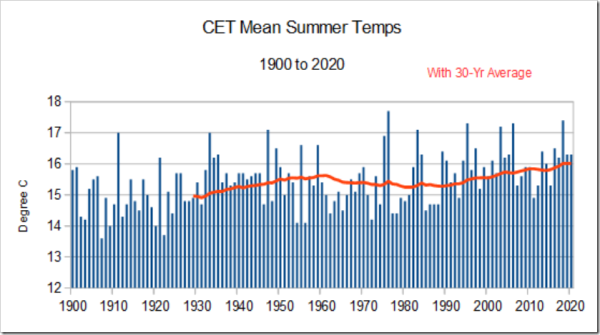England was projected to be between 3 and 4C warmer on average by the 2080s, in comparison with 1961-90.
The actual trend so far is much less dramatic:
https://www.metoffice.gov.uk/hadobs/hadcet/data/meantemp_seasonal_totals.txt
The current 30-year average is only 0.72C higher than 1961-90; but more significantly, it is just 0.40C higher than 1931-60.
Given this knowledge it is not credible to postulate that average temperatures will rise by another 3C or more in the next 60 years, particularly since temperatures in the hottest of summers do not appear to be increasing.
Even if every summer in the 2080s was as hot as last year, the long term average would still only be 2C higher than 1961-90.
Yet UKCP09 is still used as the basis for climate projections, and similar nonsense numbers are coming out of the most recent set of projections in UKCP18.
Read the whole article here: UKCP Summer Temperature Projections Are Not Supported By The Data | NOT A LOT OF PEOPLE KNOW THAT (wordpress.com)

We are on a warming trend. That much is true. We will continue to warm with more emissions of GHGs. Earth's history of GHG levels supports this.
ReplyDeleteUK Climate Projections: Headline Findings - August 2022 (PDF document)
2.3 The longest running instrumental record of temperature in the world, the Central England Temperature dataset, shows that the most recent decade (2009-2018) was around 1 °C warmer than the pre-industrial period (1850-1900). This temperature rise in the UK is consistent with warming that has been observed at a global scale, of around 1 °C since pre-industrial. The 21st century so far, has been warmer than the previous three centuries.
As the temperature on earth rises, warmer temperatures on earth support higher water vapors in the atmosphere. Water vapor is also a GHG stronger than CO2 itself. So as temperature rises, water vapor rises, which supports more warming on earth.
ReplyDelete2.5 The most recent decade (2009-2018) has been on average 1% wetter than 1981-2010 and 5% wetter than 1961-1990 for the UK overall
This is what is expected of a warming world. Hot summers become more frequent. This informs people that things like airconditioning would be more necessary on hot humid days. This also informs the need for possible better insulation in homes to bring down costs of cooling during hotter summers.
ReplyDelete3.1.3 Hot summers are expected to become more common. The summer of 2018 was the equal-warmest summer for the UK along with 2006, 2003 and 1976. Climate change has already increased the chance of seeing a summer as hot as 2018 to between 12-25%. With future warming, hot summers by mid-century could become even more common, with chances increasing further to around 50-60%.
High emissions scenarios are predicted to be worse for us living on earth. I won't be alive in this time scenario but my son will be in his later years in life. What it is exactly will depend on our emissions over that time. This is the tougher part of future emissions to live in. If we cut our emissions sooner, this scenario will not happen.
ReplyDelete3.1.5 The temperature of hot summer days, by the 2070s, show increases of 3.8 °C to 6.8 °C4, under a high emissions scenario, along with an increase in the frequency of hot spells. These results from UKCP Local (2.2km) projections reinforce the findings of the Regional (12km).
But, as the linked article says, the actual data does not agree with the projections!
ReplyDeletelooking at your link, the scenario isn't mentioned. High emissions scenario will increase temperature faster than low emissions scenario.
DeleteWhen you say actual data, do you mean the past temperature history?
Are you saying that its not possible for temperature increase to not accelerate in our global warming earth?